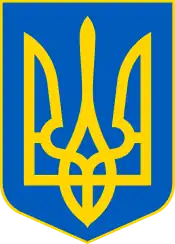Balachka
Balachka (Russian: балачка, IPA: [bɐˈlat͡ɕkə]; Ukrainian: балачка) are the dialects of Ukrainian spoken by the Cossacks of North Caucasus, especially in the region around the Kuban River.
| Part of a series on |
| Ukrainians |
|---|
 |
| Diaspora |
|
see Template:Ukrainian diaspora |
| Sub-national groups |
| Boikos · Hutsuls · Lemkos · Poleszuks |
| Closely-related peoples |
|
East Slavs (parent group) Rusyns · Poleszuks · Kuban Cossacks Pannonian Rusyns |
| Culture |
|
Architecture · Art · Cinema · Cuisine Dance · Language · Literature · Music Sport · Theater |
| Religion |
|
Eastern Orthodox (Moscow Patriarchate Orthodox Church of Ukraine) Greek Catholicism Roman Catholicism Judaism (among ethnic Jews) |
| Languages and dialects |
|
Ukrainian Russian · Canadian Ukrainian · Rusyn · Pannonian Rusyn Balachka · Surzhyk · Lemko |
|
History · Rulers List of Ukrainians |
The term originated from the Ukrainian term "balakaty'", which colloquially means "to talk", "to chat".
Some linguists characterize Balachka vernacular as a dialect or group of dialects. Balachka does not appear as a separate language on any language codes. Nevertheless, some Cossacks consider it to be a separate language and at least one academic case has been made in this regard.[1]
Kuban-Black Sea Balachka
The most significant instance of the Cossack dialect is the Kuban-Black Sea Balachka. Originally starting as a central Ukrainian dialect used by the Black Sea Cossacks who moved to the Kuban in 1792. Over the years the language began to acquire more Russian vocabulary, coinciding with the rising literacy rates in the late 19th century. The Kuban Cossack Chorus artistic director Viktor Zakharchenko points to the local folk songs dating to early and mid-19th century.,[2] where those that originated in the Kuban would have their own unique literary flavour and differ from those in standard Russian and Ukrainian. During the 1897 Russian census the dialect was classified as Little Russian (the traditional Russian name for Ukrainian) language rather than Great Russian (Russian).
Modern usage
It is not known how widespread the use of Balachka is. Education and strict requirements of the Russian Academy of Sciences mean that local press such as TV and radio adhere to standard Russian, with a notable exception for historical films (particularly those involving Cossacks) and Folk music groups and ensembles, such as the Kuban Cossack Chorus.[2]
As a result, there has been a gradual erosion in the use of authentic dialects and accents, with unique terms being slowly replaced by standard Russian ones. This is particularly noticeable in the younger generations. At the same time, beginning in the early 1990s, the re-awakening of the Cossacks movement was often done with rekindling of old traditions. It is thus not surprising that many Cossacks use Balachka (or some of its elements) in their speech to punctuate their Cossack heritage and/or affiliation.
Political aspects
Political aspects have played a direct role in the classification of the Kuban Balachka. Although this Balachka was initially officially classified as a dialect of the Little Russian language (the official term in pre-revolutionary Russia for the Ukrainian language),[3] and some Ukrainian sources actively support the idea of Balachka being a dialect of the Ukrainian language, this is being contested by some Russian linguistic research,[4] and some of the Kuban Cossacks themselves, who point out that already by the 1860s there was a separate dialect that morphed out of Ukrainian and Russian.[2]
See also
- Surzhyk - the use of Russian words on a Ukrainian grammar matrix.
- Russenorsk - a pidgin language that combines elements of Russian and Norwegian
- Diglossia - a situation of parallel usage of two closely related languages, one of which is generally used by the government and in formal texts, and the other one is usually the spoken informally
- Don group of subdialects
References
- James B. Minahan 2000 Greenwood Press One Europe, Many Nations: A Historical Dictionary of European National Groups, Kuban Cossacks p. 384 ISBN 0-313-30984-1 Retrieved 10 December 2007
- Viktor Zakharchenko, Folk songs of the Kuban, 1997 Retrieved 7 November 2007
- Demoscope.ru, 1897 census results for the Kuban Oblast
- Litvinov, N. (6 July 2001). Флаг Кубани [Flag of Kuban] (in Russian). litrossia.ru. Archived from the original on 12 January 2008. Retrieved 7 November 2007.